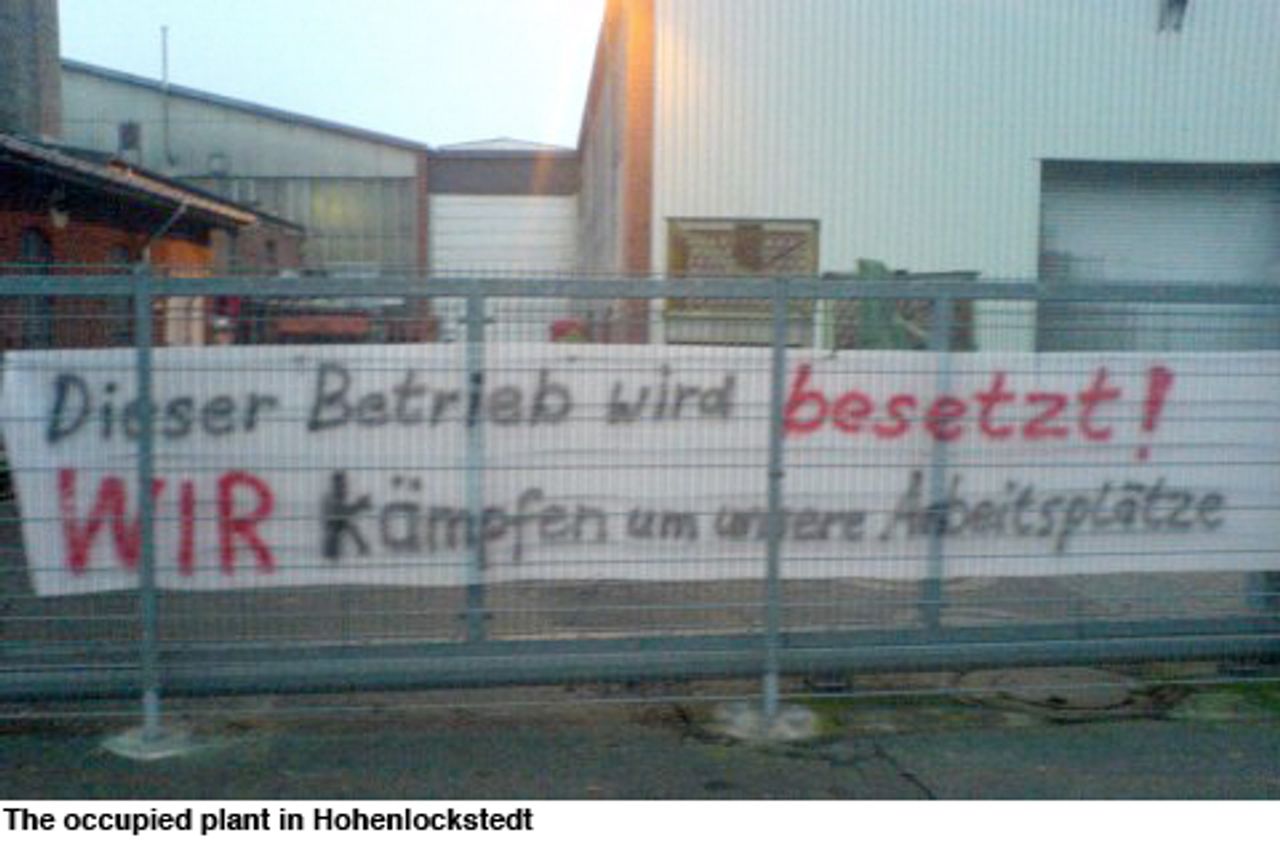On December 5, about 100 employees of the bankrupt auto parts supplier HWU occupied their factory in the small town of Hohenlockstedt, north of Hamburg. The workers are determined to defend their jobs and prevent the planned closure of the plant at the end of the year.

The workers’ union, IG Metall, is attempting to end the factory occupation following complaints from union bureaucrats at a major auto manufacturer that the action was threatening to disrupt production at that other firm.
HWU produces parts for catalytic converters, steering wheels and door locks. In June 2008, HWU was sold by its parent company, the Vollmann Group, to Horst Strodtkötter, a former employee at the factory. The workforce only learned of their new owner June 30, at a factory meeting that the new managing director did not attend.
Then six weeks ago, on October 29, Strodtkötter informed the workforce that HWU was bankrupt and unable to pay their wages in October. Strodtkötter declared that a 30 percent drop in orders resulting from the current crisis in the automotive industry had driven the company into bankruptcy.
The workers reacted at that time with a spontaneous 24-hour occupation of the premises. Their main concern was to prevent the removal of any parts or machinery that would make further production at the factory impossible. Following the declaration of a bankruptcy administrator that the company had sufficient orders, and that the outstanding wages could be paid out of insolvency funds (Insolvenzgeld--money paid by the government to workers at bankrupt firms, out of a levy on the owners), the employees returned to work.
Since then the workforce has been kept completely in the dark about any further developments. There was no further information on the future of the factory from either the managing director or the bankruptcy trustee. When it was announced last week that at the end of the year the insolvency funds would be exhausted, workers reoccupied the plant on Friday.
On Tuesday morning the factory council finally informed the workforce about the plan to close the plant. The majority of workers are to be made redundant by December 31. A skeleton staff of between 25 to 30 workers will be retained until the end of March to wind down the factory. The only hope for any retention of jobs, according to IG Metall, was via the creation of some sort of transfer company (a firm specializing in matching laid-off workers with new jobs).
The workers at the factory, however, place absolutely no confidence in such a transfer company. They are all convinced that the chances of finding alternative work in the present economic climate are almost zero. Many workers have been employed at the factory for over two decades and are ill-equipped to find new jobs at this stage of their lives and careers.
Hohenlockstedt is a small town of approximately 6,200 inhabitants in rural Schleswig-Holstein. At its peak, the factory was a thriving enterprise with up to 700 employees. Older inhabitants of the town recall when the factory operated three-shifts some 50 years ago. But such times are long past.
One worker with 37 years in the plant told a WSWS reporter how he had begun his apprenticeship there as a toolmaker and in recent years had worked predominantly in the production of spare parts. The situation for many workers is very bitter, he explained:
“Entire lives are at stake. There are many workers who began their working lives here, built a house and have small children. And then suddenly one day we were informed that everything is gone. After working here for over 35 years, I’m told that as of January 1, I can only inspect my workplace from the other side of the factory gate.”
An HWU employee who has worked as a toolmaker at the factory for 20 years stressed that the jobs situation in the region was very bad: “In the extreme case, you would have to move away from here to find new work. But under conditions where everybody has the same idea it will be difficult to find work.”
A somewhat younger worker, who started at the factory as an apprentice in 1988, pointed to the anger of the HWU employees—in particular because they had been informed about the factory’s plight at such a late stage. Workers are angry that all the skills and knowledge built up over decades of employment are now considered worthless and summarily being dismissed.


The WSWS also spoke with the chairman of the works council, Steffen Schmidt, and his deputy, Alfred Butt. When asked why IG Metall had done nothing to organise a more extensive campaign to defend the workers’ jobs, they responded by referring to disputes between the “works council princes” (union officials) active in the big car plants, who are intent on defending their own factories at the expense of all others and therefore make impossible any sort of broader solidarity between different plants and their workforces.
The perspective of IG Metall
The announcement of the closure of the facility was preceded by a series of measures aimed at reorganising the factory and which involved considerable sacrifices on the part of the workforce. The union enforced these measures by arguing that they were the only alternative to job cuts and HWU’s closing down. The result now is the complete closure of the plant. The perspective of ‘saving jobs’ by accepting wage cuts and other concessions failed catastrophically.
In 2002, IG Metall signed a contract with HWU involving a year-long reduction of the working week from 35 to 30 hours for its 225 employees with a 14 percent cut in wages. Just two years after the expiry of this contract, management announced the first bankruptcy of the factory in October 2005. The bankruptcy procedure at that time called for the shedding of 80 jobs.
IG Metall officials reacted by reaching a new contract, which abolished existing Christmas benefits and accepted other concessions. This contract ran until September 2007, when it was replaced by another involving further attacks on wages and working conditions, including the abolition of holiday pay. In return, workers were given a guarantee that their jobs would be safe until the end of 2009. This assurance has now been consigned to the waste bin following the latest declaration of bankruptcy.
The various concessions made by the trade union were incapable of saving a single job. Instead the workers were left unprepared for the planned closure of the factory. The union and the works council now regard the closure of the factory as inevitable. Their only concern is how best to negotiate the option of a possible transfer company.
IG Metall is trying to call off the occupation to ensure that the auto companies supplied by HWU receive the needed parts. The bureaucracy’s main concern is the smooth working of the German auto industry, not the fate of the HWU or any other workers.
HWU workers should establish contact with workers at these companies, independently of IG Metall, and organise a common struggle to defend jobs and production. The only future for auto workers lies in a fight for socialist policies and the nationalization of the industry under workers’ control.
In order to step up pressure on workers to return to work, managing director Strodtkötter posted a letter on the company bulletin board Tuesday afternoon threatening the immediate sacking of workers who refused to return to work. He also announced that striking workers would be forced to pay large sums to compensate for lost production.
The occupation of the HWU factory should be supported by all workers. It raises important political questions, which are relevant for workers at other companies. The most important of these questions is: who controls the productive forces and in whose interest should they be organised?
